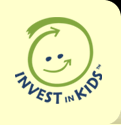Intellectual Development means being able to communicate, to think both creatively and abstractly, to pay attention, solve problems, and develop keen judgment and a lifelong readiness to learn.
|
Parents Can: Use laundry routines as an opportunity to sort family members' clothing | Child Will: Be able to identify his socks and shirts from another family members'Feel a sense of family belongingBegin to understand that similar objects can be grouped by size
| |
Parents Can: Go grocery shopping with their toddler and, together, put things away at home | Child Will: Feel she makes a contribution to the family routinesBegin to understand which foods belong in the fridge and which ones go into a cupboardSort and name fruits and vegetables
| |
Parents Can: Make playdough with their toddler | Child Will: Observe how dry ingredients change in texture through the process of "cooking"Enjoy the sensory pleasure from mixing the ingredients
|
| | |
Parents Can: Provide different sized jars and lids and, together, find out which ones go together | Child Will: Enjoy working with you to solve the problemGain confidence in trial and errorBegin to recognize common features that create sets
| |
Parents Can: Provide simple puzzles with three to six pieces | Child Will: Develop trial and error skills (try actions out and see what happens, in that way learning by mistakes made in the course of play)Enjoy the feeling of successGain confidence in her ability to put things together
|
| | |
Parents Can: Make their own sorting game, using old lids and stickers, for example, animals, cars, shapes or colours. With their toddler, sort the lids by subject, colour or any other category | Child Will: Begin to understand the concept of sorting and groupingExperiment with sorting using colour as a categoryTalk about things at home that are the same colour
| |
Parents Can: Offer experiences for their toddler to sort toys, for example, cars in one container and blocks in another | Child Will: Begin to understand the concept of sorting and groupingExperiment with sorting using size as a category, for example, putting all the big blocks in one pile and the little ones in another
| |
Parents Can: Play with playdough using different tools, cookie cutters and so on | Child Will: Compare the different sizes and shapes of objects he createsExperiment with different actions on the playdough, for example, rolling it with a rolling pin versus rolling it in his handExplore the many things that can be made with playdough
|
| |
|
